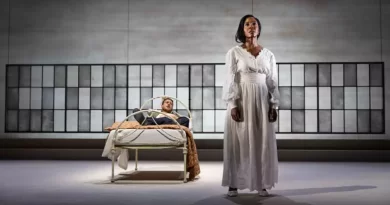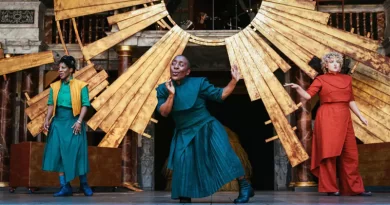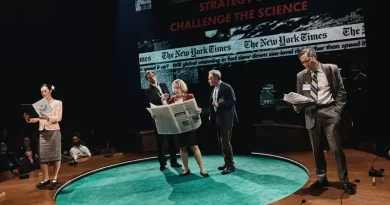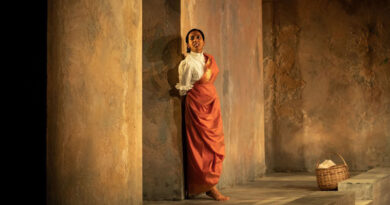“Wish You Were Here” at Yale Rep
Robert Schneider in New Haven, Connecticut
13 November 2023
Sanaz Toossi’s Wish You Were Here places the friendship of six young Iranian women against a background of revolution, war and theocratic repression. In Nozonin’s living room, we overhear them chatter about a variety of subjects, some trivial and some not. Gradually, we accept that conversations that comprise the warp and woof of friendships made early in life, friendships that endure regardless of circumstances, are never trivial. It’s a particular merit of the play that it honours triviality. Toossi’s women address each other and never (or almost never) the larger question. There’s no grandstanding and no sudden eloquence.
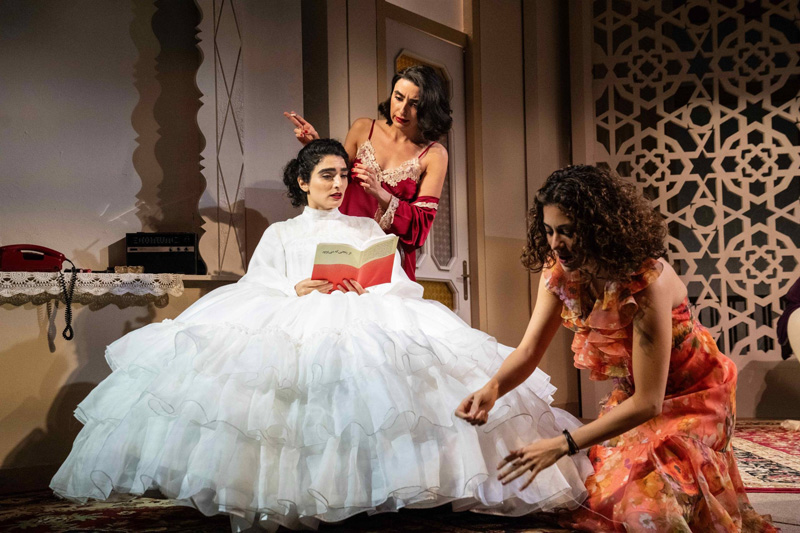
Bahar Beihaghi, Vaneh Assadourian and Anita Abdinezhad.
Photo credit: Joan Marcus.
Because the play covers the pre-Internet age from 1978 to 1991 these friendships repose on a shaky stratum of hand-written letters, forwarding addresses scribbled in haste and, later, a telephone number in another country that is expensive to dial and may be wrong. To stay in touch requires effort and a bit of luck. Yet as opportunities for women dry up in the Islamic Republic, friendships are what is left to them.
The women are not poor. When we meet them in Shah Pahlavi’s oil-rich Iran, several of them are studying for professional degrees. The 1979 Revolution abridges their careers but doesn’t impoverish them materially. It doesn’t too much disturb them ideologically, either. “I don’t see the point of going to the beach when we’re covering,” one of them observes mildly. Feminine but not feminist, the women are not political. They study clothes and makeup. One part or another of their bodies in every scene: waxing each other’s legs, smoothing feet, doing nails, critiquing eyebrows or teasing hair. There is always something that needs maintenance. Periodically, there are weddings to prepare.
In an age that cries loudly over desperate migrants and victims of terrorism, the friends’ obsessions seem banal, but Toossi isn’t begging for outrage; she just wants us to understand.
Time and chance overtake the characters one by one. Shideh (Shadee Vossoughi) leaves to study medicine in an unspeakably exotic land called “Indiana.” Zari (Ava Lalezarzadeh), marginalized in the group as well as professionally, also emigrates.

Anita Abdinezhad and Sahar Bibiyan.
Photo credit: Joan Marcus.
The women are secular except for Salme (Bahar Beihaghi). Several of the women’s outings are delayed so she can pray. Salme drowns while attempting to swim in the voluminous robes the conservative regime requires for women, even while in the water.
In this way, Nozonin (Anita Abdinezhad) becomes the central character by default: Her friends are all gone. She marries and has children, but we never meet her family; we only see the children’s toys under the sofa. A new friend (Sahar Bibiyan) appears, but it’s not the same—no, not quite the same.
Curiously, Nazanin insists on shunning the friends whose absence she perceives as abandonment. She finds their disappearance from her life inexcusable, whatever the reason. Only a late-inning phone call from Rana (Vaneh Assadourian), a Jewish woman who went missing with her entire family during the Revolution, reminds her of the connections she has lost and provides emotional closure for the audience.
Rana survived the repression, left Iran, and now works at a Pizza Hut in San Jose. Her phoned-in tribute to political stability, human rights and pluralism is all the more moving for being so understated. Pizza Hut is no Eldorado, but she finds it infinitely preferable to brutal treatment at home. She cherishes American solidity, something Americans themselves have begun to question. She’s planning to move to Orange County, south of L.A. Her children will never learn Farsi and she is fine with that.
Omid Akbari’s scenic design conjugates “upper middle class” in Persian. While many miles removed from New England, his white couch and hangings convey transnational notions of prestige and comfort, values that the Rep’s Connecticut audience no doubt understands.
Sivan Battat directed a cast of Iranian-American actresses who are uniformly excellent. Their musings on exile and remembrances of absent friends fill four pages of the programme.


